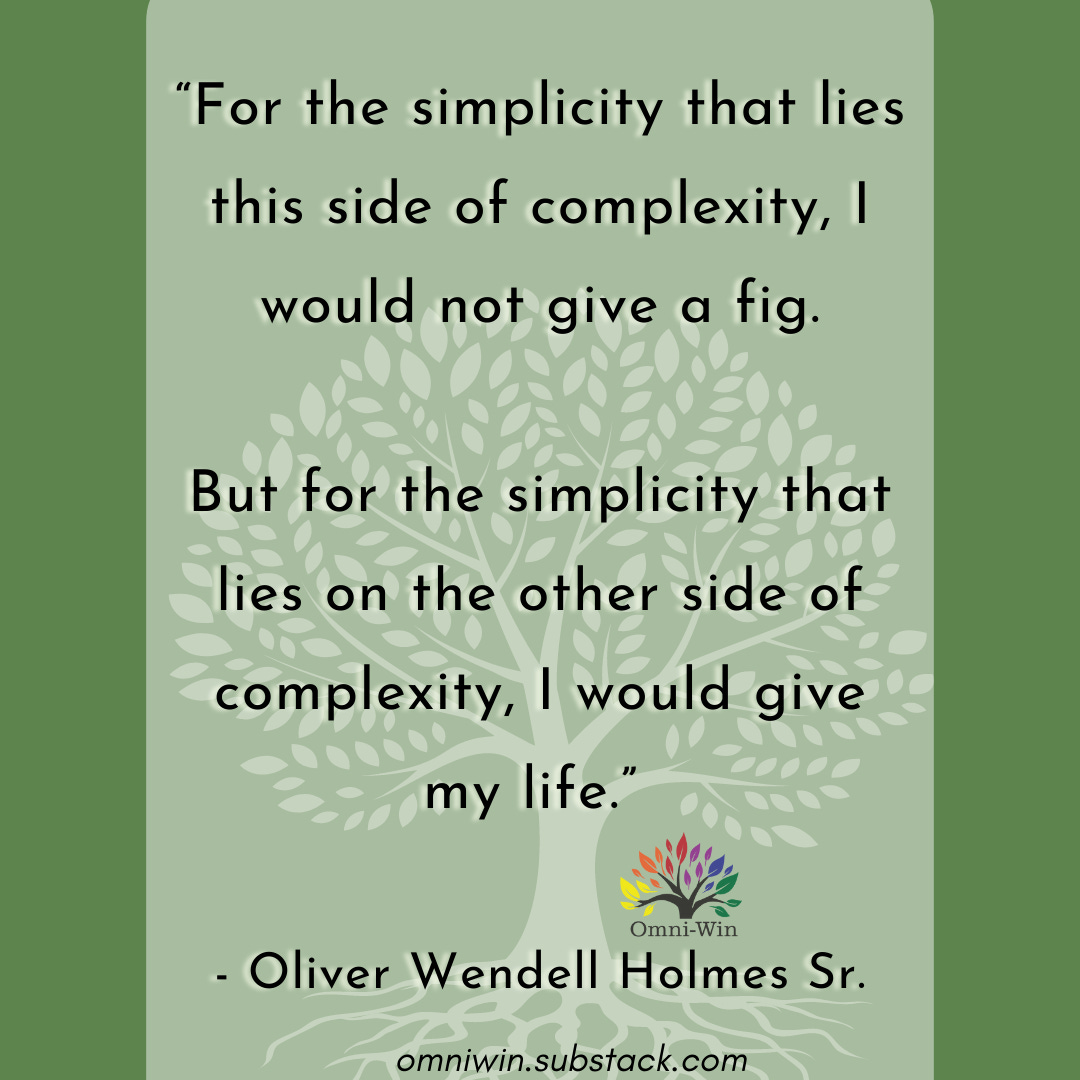How Do We Solve These Wicked Problems?
With a world so polarized, how do we drop the simplicity and look for the nuance in our conversations?
How can we move from over-simplistic, polarizing ways of thinking toward the complex, nuanced conversations we need to have? That’s what we’re looking at today.
I'm going to start with one of my favorite quotes. It’s from Oliver Wendell Holmes Sr:
I want to emphasize just how beautiful this concept is. We don't want simple answers just because they're easy and we haven't thought things through. We need simple answers, but they only come from elegant solutions that consider all the pieces.
In my last essays, we looked at the political-industrial complex. The media, politicians, lobbyists, and corporations all benefit from us staying divided. They're benefiting from polarization.
While they're not necessarily in a cabal to figure out how to keep us polarized, they continue to keep us in this division. Why? Because it's better for them to be in the constant flow of trying to solve the problems than actually solving them.
They offer us simple solutions: Yes or no answers. They give us bundled, fixed solutions to super complex things that need far more than a binary answer.
The problems we're facing are real. We have serious issues we need to figure out. One of the reasons why political conflict is so challenging is because this is life or death. It’s about our future generations. People will fight tooth and nail about this stuff.
All of these issues require us to think with nuance and complexity. We need to ensure that we have diverse perspectives because no one can figure this out alone.
No President, Congressperson, representative, or office will figure out all the solutions with a quick poll and a focus group. They need everyone to engage. We need all the perspectives in these crucial conversations so we can ensure we’re working for everyone’s benefit.
Polarizing problems
The Pew Research Center named these as some of the most polarizing issues:
Climate change
Environmental protection
Military
Guns
Healthcare
Education
Immigration
We also have race relations, poverty, and economics. Of course, there's COVID, an issue we've all been paying attention to, and it’s easy to recognize the polarizing aspect of that. Someone pointed out that once we're polarized, we will have a polarized response to any complex subject because we're trying to find simplicity.
The issues we're facing are “wicked problems.” The phrase comes from a design theorist, Horst Rittel, and his book, Dilemmas In A General Theory of Planning.
What is a wicked problem?
Firstly, every wicked problem is unique, and there isn't a formula. Usually, a wicked problem is a symptom of a bunch of other problems. There are problems within problems. There isn’t a single explanation or solution for a wicked problem.
When all the different perspectives look at an issue, everyone explains it uniquely. People focus on different things. In a previous essay, I talked about how culture gives salience or meaning. Everyone sees things from various viewpoints. That’s how diversity works to our advantage.
A wicked problem has many different perspectives and explanations. There are potentially infinite solutions to any wicked problem, but there are some tricks to the solutions.
First of all, there's a no-stopping rule. We’re not going to get to the final solution because we wouldn’t know it when we got there. We have to keep playing the game. Part of this is that there are no right or wrong answers, but there’s no easy answer.
With these solutions, we don’t get a test run. If we try and solve a wicked problem, we impact the system, and something will happen. The only way we'll know if we're solving it is if things start getting better or worse.
The other trick about wicked problems is that the people who design the solutions are responsible for them. Maybe that points to why our politicians and governments don't want anything to do with the solution. Trying to solve it would mean they’re responsible for the outcome, which is pretty tricky.
The most critical issues have many solutions and no easy answers. This applies to all the issues we're most polarized about. They are all wicked problems.
Where do we go from here?
I want to introduce you to two theories that I find helpful. They can help us rethink wicked problems and get away from simplicity and polarization.
These two approaches are a fundamental part of the Omni-Win Project:
Complexity Theory is about complex adaptive systems and helps us understand the nature of our problems.
Polarity Thinking comes from a gentleman named Barry Johnson. It gives us a way of seeing how we can approach various problems. It helps us understand the nature of solutions and why there isn't necessarily one fixed solution.
The combination of these can be very powerful, and they're both about the process, not a one-and-done, fixed solution. So I want to talk to you about complexity theory and polarity thinking next time to see how we can approach our wicked problems.
If you prefer to watch your content, here’s a video on the topic of this essay:
You can find more information about the work I do in conflict transformation on my website: http://www.omni-win.com
You can schedule a call with me here: https://calendly.com/duncanautrey
Don’t forget to check out the rest of my posts as I discuss how we can work together to ensure we all win.
If you’d like to see more of these posts, subscribe to Omni-Win Visions here on Substack:
It would also be great if you could subscribe to my YouTube channel, where you can watch more of my long-form content, authentic discussions, and weekly content:


